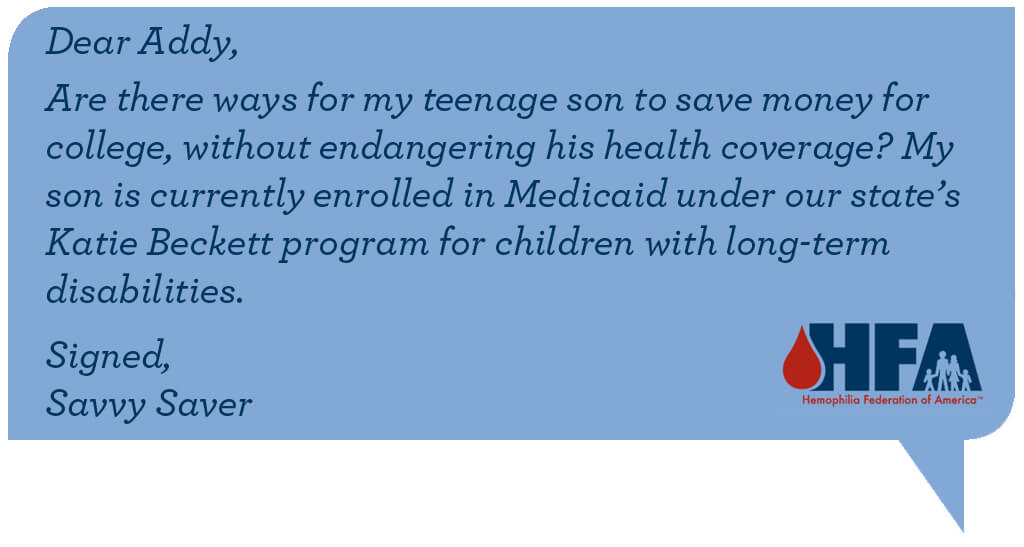
Dear Addy,
Are there ways for my teenage son to save money for college, without endangering his health coverage? My son is currently enrolled in Medicaid under our state’s Katie Beckett program for children with long-term disabilities.
Signed,
Savvy Saver
Dear Saver,
Here’s one option you and your son may wish to explore: opening an ABLE account.
Congress passed the law creating ABLE accounts in 2014. Before passage of this law, as you note, people with disabilities were very limited in how much money they could save without endangering their eligibility for Medicaid and other federal public programs, including Social Security. The ABLE law was designed to allow disabled individuals and their families to accumulate savings that can support health, independence, and quality of life – without forfeiting their Medicaid and related benefits.
Eligibility: ABLE Accounts are available only to:
- individuals with significant disabilities
- with an age of onset of disability before turning 26 years of age.
- (Individuals over 26 may still be eligible, so long as their disability occurred before their 26th birthday.)
If an individual meets these criteria and also already receives Social Security benefits for disability, s/he is automatically eligible to establish an ABLE account. Individuals who don’t receive Social Security benefits may still be eligible to open ABLE accounts if they (a) certify that they meet Social Security’s criteria regarding significant functional limitations, (b) have a doctor’s letter confirming that diagnosis, and (c) meet the age of onset criterion.
Anyone may contribute money to the account – the owner, family, or friends – but total annual account contributions cannot exceed $14,000/year (this limit rises to $15,000 in 2018). An eligible individual may own only one ABLE account.
Features of an ABLE account: Although the ABLE Act is a federal law, ABLE programs are set up and administered at the state level. As of November 2017, 28 states and the District of Columbia have active ABLE programs. Even if your state does not have an active program, you may be able to open an ABLE account: about ¾ of the states allow out-of-state enrollees to participate in their programs.
Money in an ABLE account gets special tax treatment under federal law so long as the owner uses those funds for “qualified disability expenses.” This broad category includes education as well as medical treatment, job training, housing, assistive technology, and legal and administrative fees – basically, anything that helps the beneficiary “in maintaining or improving his or her health, independence, or quality of life.”
Who might want to consider establishing an ABLE account? Families may want to discuss with their financial advisor whether establishing an ABLE account is right for them. Here are a couple of considerations to keep in mind:
- What are the investment options offered by the particular ABLE program? Will the options meet your investment goals? your risk tolerance?
- Does the account charge management fees on an ongoing basis? Or are all fees paid at one time, when you open the account?
- Are there restrictions on how often the owner can withdraw funds from the account? Is there a “debit card” option available with the program (and, if so, are there added costs for this option)?
- Is there a minimum contribution to open the account?
You can find more information about ABLE accounts at the ABLE National Resource Center.
Sincerely,
Addy
Have a question? Click HERE. Your name will be changed in the response.
HFA frequently receives questions from the bleeding disorders community related to advocacy issues. The questions often impact the entire community. In an effort to reach the largest audience possible with our responses to these widely applicable questions, HFA developed “Dear Addy.” Questions submitted to this column are edited in order to protect privacy and should be considered educational only, not individual guidance.



